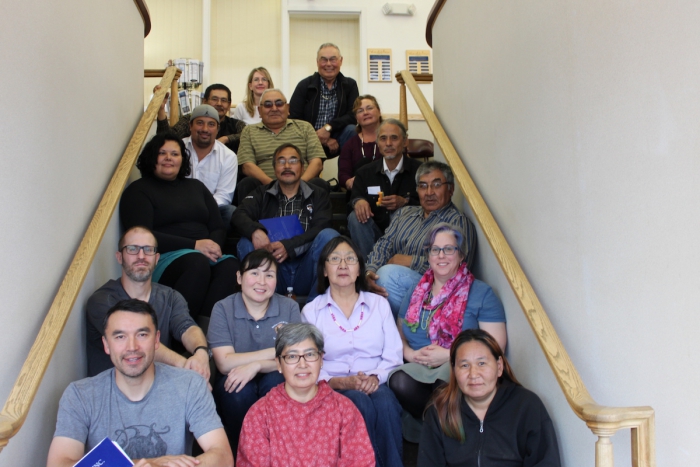By: Brenden Raymond-Yakoubian, Sandhill.Culture.Craft Principal and Julie Raymond-Yakoubian, Kawerak, Inc., Social Science Program Director
Kawerak, Inc., the Alaska Native non-profit tribal consortium for the Bering Strait region, and Sandhill.Culture.Craft, a social science research and consulting firm based in Girdwood, Alaska, partnered to hold a two-day workshop in August 2016 to discuss key Indigenous perspectives on a variety of issues regarding the relationships between Indigenous communities and research processes. Nine workshop participants from western and northern Alaska Indigenous communities and organizations attended in addition to seven other guests and observers, including guests from the Inuit Circumpolar Council Alaska, the National Science Foundation (NSF), the National Park Service, and Kawerak. The workshop was funded by NSF's Arctic Social Science and Oceans Sciences Divisions. The Kawerak Marine Program and the National Park Service Bering Land Bridge National Preserve Alaska also provided support.
The workshop was part of a larger project conducted by Kawerak and Sandhill.Culture.Craft: an anthropology of research to examine the relationships between research and Indigenous communities from a holistic perspective. This larger project seeks to understand this "landscape" of inter-relationships. Project Leads Julie Raymond-Yakoubian and Brenden Raymond-Yakoubian see this as a valuable endeavor that can inform future work on the nexus between communities and research by grounding that work with a holistic look at the complex web of people, institutions, and processes that are involved in this nexus. The workshop and larger project take place within a backdrop of increasing attention to research processes in the north as an object of discussion and inquiry. This has included conversations about, among other things, increased research activities and impacts to communities, how to integrate communities and their concerns and knowledge into research, and changing protocols and standards.
The workshop was successful in its goal of providing a forum for discussion of key Indigenous perspectives on these issues (regarding which, these are historically the most under-represented voices). The workshop participants focused discussion on four main topics:
What is the overall "landscape" of research processes that are in, near to, or otherwise affect Indigenous communities?
What are Indigenous concerns, perspectives, and needs regarding research?
What are some ways forward that can change the relationships between research processes and Indigenous communities for the better?
As a special case study, the group also set aside time to have expanded discussions of ship-based research regarding the three questions noted above.

Workshop participants and observers discussed the above topics in detail, and some gave presentations to the group about significant issues and experiences. A number of important cross-cutting themes were identified from the workshop discussions. A key perspective was that there are needs and desires for changes to occur in research processes to improve relationships between research and Indigenous communities. For example, participants noted a desire for a greater oversight of research. Another thread that arose was that research is often interconnected with existing and long-standing concerns related to power imbalances, cross-cultural differences, and a history of colonialism. Furthermore, a noted theme was that Indigenous people are often placed in complex binds with regard to their engagement with research. It was noted that communities have a desire for greater involvement of Indigenous people—including their knowledge, concerns, and priorities—in many ways and at many levels throughout the entire scope of research processes. It was also clear during the workshop that subsistence and natural resources—and the protection of them—is of paramount importance to communities, and the consideration of this extends to research issues.
These were just some of the broader themes and findings from the workshop. The findings from this workshop will be integrated into the current and future activities of the larger project, which will include additional workshops, interviews, ethnographic observation of key events, and other activities.
More information can be found in a publicly-available report discussing the workshop and its results in greater detail. The report can be downloaded from the Kawerak Social Science Program website as a PDF.
The perspectives of all people involved in northern research are fundamental to the project, and as such the project leads would greatly welcome any perspectives from those who read this article. For inquiries about, and interest in, the project, please contact the Project Leads Brenden Raymond-Yakoubian (brenden [at] SandhillCultureCraft.com) and Julie Raymond-Yakoubian (juliery [at] kawerak.org).
About the authors
Brenden Raymond-Yakoubian is an anthropologist and the Principal at Sandhill.Culture.Craft, a social science research and consulting firm based in Girdwood, Alaska.
Julie Raymond-Yakoubian is an anthropologist and the Social Science Program Director at Kawerak, Inc., the Alaska Native non-profit tribal consortium for the Bering Strait region.
